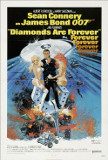Diamonds Are Forever (United Kingdom, 1971)

Released in 1971, Diamonds Are Forever was Sean Connery's final "official" turn as James Bond (although he eventually starred in Never Say Never Again, 1983's Thunderball remake). After skipping On Her Majesty's Secret Service, Connery was lured back to the 007 role by an extremely lucrative offer that made him the highest-paid actor at the time. His presence, in addition to a few typically-energetic action sequences, is about the only thing that makes this film worthwhile, however. By the time Diamonds Are Forever was produced, the series had begun to slip into the stagnancy that would mar Roger Moore's first two outings, Live and Let Die and The Man with the Golden Gun.
For this outing, most of the behind-the-scenes crew from Goldfinger was reassembled, probably with the hope of duplicating the 1964 film's success. Guy Hamilton again directed, Ted Moore wore the cinematographer's cap, and mainstays Richard Maibaum (screenplay) and John Barry (score) continued their association with the series. Shirley Bassey, who belted out "Goldfinger", returned to lend her vocal gifts to the title song. Unfortunately, Diamonds Are Forever's script deficiencies precluded a film of comparable quality to Goldfinger.
The seventh Bond movie opens with the British agent seeking out his chief nemesis, Blofeld (Charles Gray), to exact revenge for the murder of his wife, Tracy (she was shot during the final scene of On Her Majesty's Secret Service). After dispatching Blofeld, 007 accepts an assignment to investigate diamond smuggling. Impersonating a smuggler, he travels from Amsterdam to Las Vegas with fifty thousand carats of stones for reclusive multi-millionaire Willard Whyte (Jimmy Dean). No one knows why Whyte is stockpiling diamonds, but everyone who gets involved in the smuggling operation ends up dead. Joining forces with old pal Felix Leiter (Norman Burton) and "free agent" Tiffany Chase (Jill St. John), who's also after the diamonds, Bond penetrates Whyte's private apartments only to receive a very nasty surprise.
Diamonds Are Forever is plagued with problems. After a promising start, the story devolves into idiocy. The parts about diamond smuggling and a rich eccentric hiding out in a hotel penthouse are fine, but as soon as the script introduces Blofeld's double and a laser-shooting satellite, things become laughably absurd, even for a Bond movie. The space-based science fiction elements, which are on the same level as those in You Only Live Twice, aren't handled nearly as well as in a pair of later entries, Moonraker and Goldeneye. The ending is anticlimactic, with all of Blofeld's megalomaniacal plans foiled by the simple expediency of stealing a cassette tape.
Connery's presence elevates the movie to a remarkably high level, but that's no surprise. His Bond is definitive -- a pleasure to watch even in a sub-par film. It's easy to like Diamonds Are Forever exclusively because of the lead actor. Unfortunately, the supporting cast doesn't give him much help. Charles Gray isn't sinister enough as Blofeld (who, like his cat, seems to have nine lives). In fact, of the various actors to play this role, Gray's effete interpretation is the worst. Then there's Jill St. John, the first American Bond girl, who gives one of the most irritating female performances in a 007 feature. Norman Burton is immediately forgettable as Leiter, and Jimmy Dean plays Whyte like a buffoon.
Diamonds Are Forever's hallmark action sequence is an extended car chase that begins with 007 zipping across the Nevada flatlands in a moonbuggy and ends with him careening through the streets of Las Vegas with a fleet of police cars in pursuit. There's also an enjoyable fight scene where Bond is beaten up by two high-kicking women (Bambi and Thumper). The ending, while high on pyrotechnics, is low on tension, bringing Connery's era to a rather dissatisfying conclusion. The actor deserved to go out on a higher note, but his tenure as Bond provided enough moments of quality entertainment to eclipse Diamonds Are Forever's final whimper.
Diamonds Are Forever (United Kingdom, 1971)
Cast: Sean Connery, Charles Gray, Jill St. John, Jimmy Dean, Bruce Cabot, Norman Burton, Bernard Lee, Lois Maxwell, Desmond Llewelyn
Screenplay: Richard Maibaum and Tom Mankiewicz based on the novel by Ian Fleming
Cinematography: Ted Moore
Music: John Barry
U.S. Distributor: United Artists
U.S. Release Date: -
MPAA Rating: "PG" (Violence, Sexual Situations)
Genre: ACTION/THRILLER
Subtitles: none
Theatrical Aspect Ratio: 2.35:1
- (There are no more better movies of Charles Gray)
- Rocky Horror Picture Show, The (1975)
- (There are no more worst movies of Charles Gray)
- (There are no more better movies of Jill St. John)
- (There are no more worst movies of Jill St. John)
Comments